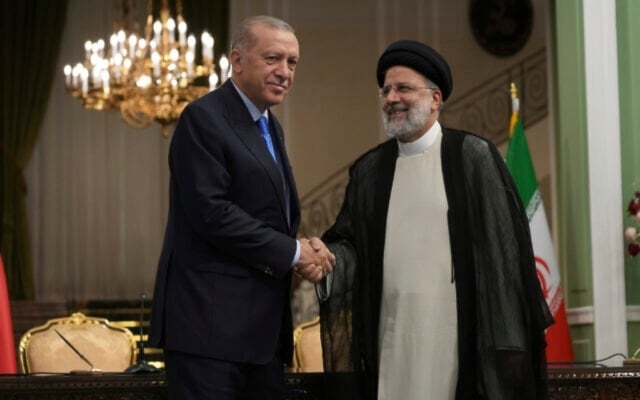Erdogan, Raisi tackle Gaza, urge effective and practical OIC decisions
Iran rejects a G7 statement that called on Tehran to cease supporting Hamas and "taking actions that could destabilize West Asia."
-

Turkish President Recep Tayyip Erdogan, left, and his Iranian counterpart Ebrahim Raisi shake hands after their joint press briefing at the Saadabad Palace, in Tehran, Iran, July 19, 2022. (AP)
President Recep Tayyip Erdogan and Iranian President Ebrahim Raisi had a meeting during the 16th Economic Cooperation Organization (ECO) summit in Tashkent, Uzbekistan. The central topic of their discussions was the situation in Gaza within the context of the Palestinian-Israeli struggle.
Turkish sources reported that the talks primarily revolved around addressing the humanitarian crisis resulting from ongoing Israeli aggression on Gaza, outlining potential steps for resolution.
The two presidents also delved into matters related to Turkish-Iranian relations and regional issues.
President Erdogan emphasized the importance of the Organization of Islamic Cooperation (OIC) extraordinary summit in Saudi Arabia, stressing the need for a just solution and highlighting that an end to Israeli attacks would contribute to regional and global peace.
The two presidents agreed that effective and practical decisions need to be made to help resolve the unfolding catastrophic situation in Gaza when the OIC meets in Riyadh, Saudi Arabia, on Sunday (Nov. 11) to discuss the Israeli aggression on Palestine.
The Turkish President stressed the need for the Islamic world to adopt a united position regarding Israeli crimes and increase pressure against the occupying entity.
In response, Iran rejected a G7 statement that called on Tehran "to cease supporting Hamas and taking actions that could destabilize West Asia," including supporting Lebanese Hezbollah and other non-state actors.
In response, Iranian Foreign Ministry Spokesperson Nasser Kanaani strongly criticized the statement from the G7 countries, which include the United States, Britain, Germany, Canada, Italy, France, and Japan. Kanaani argued that Iran has been actively working to halt the Israeli attacks on Gaza. He expected the G7 foreign ministers' meeting in Tokyo to fulfill their international responsibility by condemning the actions of "Israel" that violate human rights and international law.
“What was expected from the meeting of the Group of seven foreign ministers in Tokyo was to fulfill their international responsibility, including condemning the acts of the Zionist regime that violate human rights and international law in Gaza,” he added.
Read next: Gaza to be most important issue during Raisi's Central Asia visit

 2 Min Read
2 Min Read








